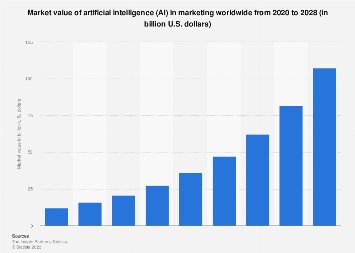So you’ve heard the buzz about AI and its impact on digital marketing, but just how big is this market? Well, let’s dive into the numbers. The AI market in digital marketing is on a rapid rise, fueled by the ever-increasing demand for personalized customer experiences and optimized marketing strategies. With AI-powered tools and technologies becoming more accessible, businesses of all sizes are investing in AI to enhance their marketing efforts. From chatbots and recommendation engines to predictive analytics and automated content creation, AI is revolutionizing the way marketers reach and engage their target audience. Want to know just how big this market is? Keep reading to find out!
Current state of the digital marketing industry
Rapid growth of digital marketing
Digital marketing has been experiencing rapid growth in recent years, thanks to advancements in technology and the widespread use of the internet. As more and more consumers rely on digital channels to discover and engage with brands, businesses have shifted their focus to online marketing strategies. From social media advertising to search engine optimization, digital marketing has become an essential aspect of any successful marketing campaign.
Importance of AI in digital marketing
One of the key driving forces behind the growth of digital marketing is the integration of artificial intelligence (AI) into marketing practices. AI, which refers to the simulation of human intelligence in machines, has revolutionized various industries, and marketing is no exception. With AI-powered tools and platforms, businesses can now automate and optimize their marketing efforts, leading to more effective and efficient campaigns.
Overview of the AI market
Definition of AI
Before delving deeper into the AI market in digital marketing, it is crucial to understand what AI actually entails. AI can be defined as the capability of machines to imitate intelligent human behavior, enabling them to learn, reason, and make decisions. It involves various technologies, including machine learning, natural language processing, and computer vision, all of which contribute to the development of intelligent systems.
Role of AI in digital marketing
AI plays a fundamental role in digital marketing by empowering businesses to analyze vast amounts of data and extract valuable insights. By leveraging AI algorithms to process and interpret data, marketers can gain a better understanding of consumer behavior, preferences, and trends. This information allows them to deliver personalized experiences to customers, optimize marketing campaigns, and maximize return on investment.
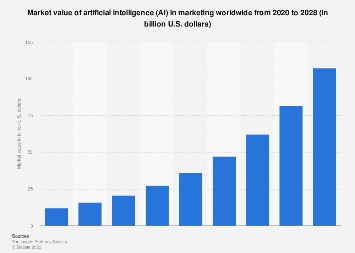
This image is property of cdn.statcdn.com.
Size and projected growth of the AI market
Global AI market size
The AI market has been expanding rapidly in recent years, and its growth shows no signs of slowing down. According to a report by Grand View Research, the global AI market size was valued at $39.9 billion in 2019 and is expected to reach $733.7 billion by 2027, growing at a CAGR of 42.2% from 2020 to 2027. This remarkable growth is primarily driven by the increasing adoption of AI across various industries, including digital marketing.
Growth drivers of the AI market
Several factors contribute to the projected growth of the AI market in digital marketing. Firstly, the rising demand for personalized experiences and targeted advertising has led businesses to invest in AI-powered solutions. Secondly, advancements in technology have made AI more accessible and affordable, allowing small and medium-sized enterprises to integrate AI into their marketing strategies. Lastly, the increasing reliance on digital channels and the availability of vast amounts of data have created a need for AI to efficiently process and analyze this data.
Applications of AI in digital marketing
Personalized advertising
One of the most significant advantages of AI in digital marketing is its ability to enable personalized advertising. Through machine learning algorithms, marketers can analyze user behavior and preferences to deliver targeted ads that resonate with individual consumers. AI can segment customers based on their demographics, interests, and past behavior, allowing businesses to create personalized and highly relevant ad campaigns. This not only enhances the customer experience but also improves conversion rates and returns on advertising investments.
Content creation and curation
AI has the potential to revolutionize content creation and curation in digital marketing. With natural language processing and machine learning, AI can generate high-quality content, such as blog posts, product descriptions, and social media posts. This can save marketers valuable time and resources, while still ensuring that the content aligns with the brand’s voice and style. Additionally, AI-powered content curation tools can curate relevant content from across the web, enabling businesses to provide their audience with valuable and engaging information.
Customer segmentation and targeting
AI allows marketers to segment and target customers more effectively by analyzing vast amounts of customer data. By leveraging AI algorithms, businesses can identify patterns and trends in customer behavior and preferences, enabling them to create targeted marketing campaigns. AI can also help businesses identify high-value customers and optimize their marketing efforts to maximize customer acquisition and retention. With AI, marketers can ensure that their messages reach the right audience at the right time, leading to improved campaign performance and customer satisfaction.
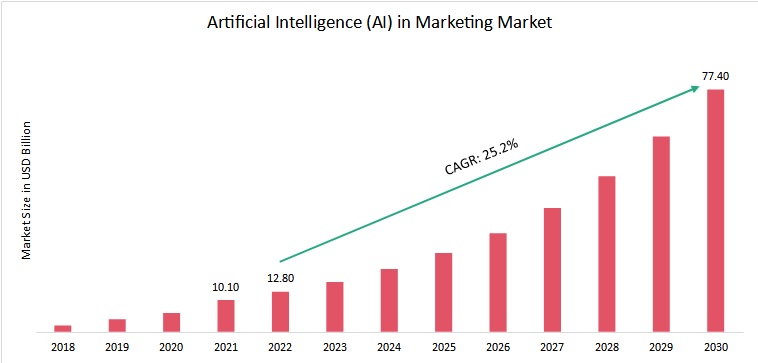
This image is property of www.marketresearchfuture.com.
AI-powered tools and platforms in digital marketing
AI-driven chatbots
AI-driven chatbots have become increasingly popular in the digital marketing landscape. These chatbots use AI algorithms to simulate human conversations, allowing businesses to provide instant and personalized customer support. Chatbots can answer frequently asked questions, assist with product recommendations, and even complete transactions. By leveraging AI-powered chatbots, businesses can enhance customer engagement, improve response times, and reduce operational costs.
Automated email marketing
Email marketing is a crucial component of any digital marketing strategy, and AI has made it more efficient and effective. AI-powered tools can analyze customer data, such as past purchases and browsing behavior, to deliver personalized and targeted email campaigns. These tools can automatically segment customers, create personalized email content, and optimize send times for maximum engagement. With AI-driven automated email marketing, businesses can nurture leads, drive conversions, and strengthen customer relationships.
Programmatic advertising
Programmatic advertising, which involves using AI algorithms to automate ad buying and placement, has transformed the digital advertising landscape. With programmatic advertising, marketers can target specific audiences in real-time based on demographics, behavior, and other factors. AI algorithms analyze available data to optimize ad placements, ensuring that ads are shown to the most relevant audience. This not only improves the efficiency and effectiveness of advertising campaigns but also reduces costs by eliminating the need for manual ad buying and placement.
Industry sectors benefiting from AI in digital marketing
E-commerce and retail
The e-commerce and retail sectors have greatly benefited from AI in digital marketing. AI-powered recommendation engines analyze customer data to provide personalized product recommendations, enhancing the customer shopping experience and driving conversions. Additionally, AI helps businesses optimize pricing strategies, inventory management, and supply chain operations, resulting in improved operational efficiency and profitability.
Financial services
AI has had a significant impact on the financial services industry, particularly in digital marketing. AI-powered chatbots assist customers with account management, queries, and even financial advice. Furthermore, AI algorithms analyze financial data to detect fraud, identify investment opportunities, and personalize financial recommendations. By leveraging AI in their marketing strategies, financial institutions can provide better customer experiences, streamline processes, and make data-driven decisions.
Healthcare
In the healthcare sector, AI has revolutionized digital marketing by enabling more personalized and targeted healthcare services. AI-powered tools can analyze patient data to provide personalized treatment recommendations and reminders. Additionally, AI algorithms can analyze medical imaging scans to assist in diagnosing diseases and identifying anomalies. Through AI-driven marketing campaigns, healthcare providers can reach and engage with their target audience, ultimately improving patient outcomes and satisfaction.
Travel and hospitality
The travel and hospitality industry has also embraced AI in digital marketing to enhance the customer experience. AI-powered chatbots and virtual assistants provide real-time assistance with travel bookings, hotel reservations, and itinerary recommendations. AI algorithms analyze customer preferences and behavior to offer personalized travel recommendations and discounts. By incorporating AI into their marketing strategies, travel and hospitality businesses can improve customer satisfaction, increase bookings, and drive repeat business.
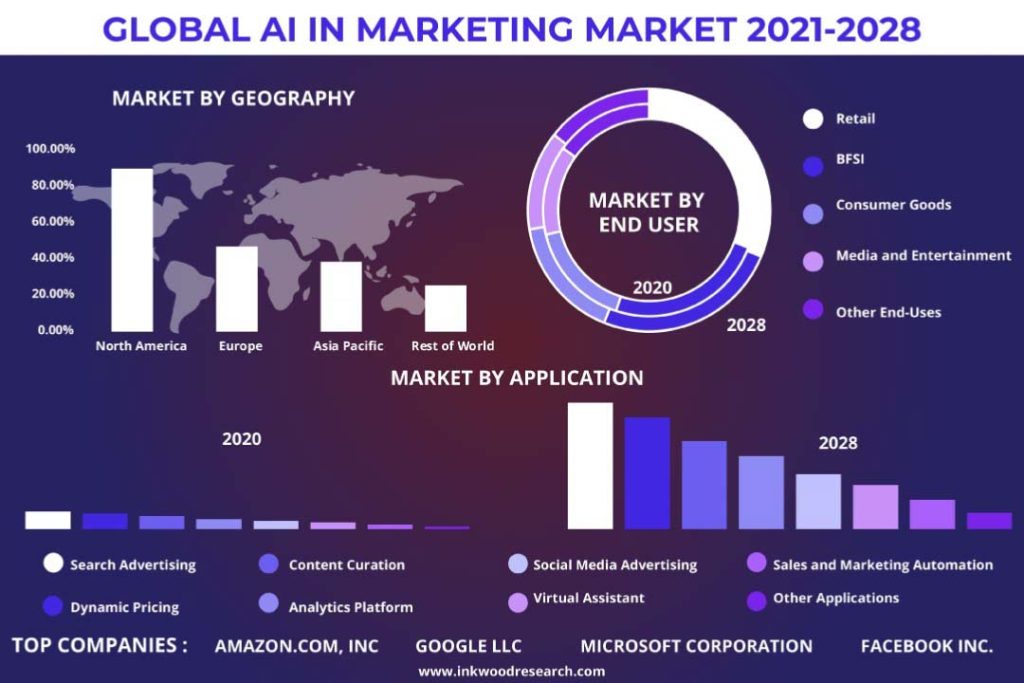
This image is property of inkwoodresearch.com.
Challenges and limitations of AI in digital marketing
Data privacy and security
One of the major challenges of using AI in digital marketing is ensuring data privacy and security. AI systems rely heavily on data, including personal and sensitive information, to generate insights and make decisions. As such, businesses must ensure that proper data protection measures, such as encryption and secure storage, are in place to safeguard customer data from unauthorized access or breaches. Additionally, businesses must comply with relevant data protection regulations to maintain consumer trust and avoid legal consequences.
Ethical considerations
The use of AI in digital marketing raises ethical considerations that businesses must address. AI algorithms can inadvertently perpetuate biases and discrimination if not designed and monitored properly. For example, AI-powered targeting algorithms may unintentionally exclude certain demographic groups from receiving targeted ads. It is crucial for businesses to be mindful of these ethical concerns and ensure that AI systems are fair, transparent, and accountable.
Human-AI collaboration
While AI offers numerous advantages in digital marketing, it is important to recognize the need for human-AI collaboration. Although AI can analyze vast amounts of data and make data-driven decisions, human input and expertise are still essential. Human marketers provide the creativity, intuition, and strategic thinking that complement AI’s capabilities. Ensuring effective collaboration between humans and AI systems is key to maximizing the benefits of AI in digital marketing.
Key players in the AI market
Leading AI companies
The AI market is populated by several leading companies that are driving innovation in digital marketing. Companies such as Google, IBM, Microsoft, and Amazon have heavily invested in AI research and development, and their AI-powered tools and platforms are widely used in the industry. These companies offer a range of AI solutions, including machine learning frameworks, natural language processing APIs, and automated marketing platforms.
Partnerships and acquisitions
In addition to the leading AI companies, numerous partnerships and acquisitions have shaped the AI market in digital marketing. Tech giants often form partnerships with niche AI companies to leverage their specialized expertise. Moreover, acquisitions are common in the AI industry, with larger companies acquiring startups to enhance their AI capabilities. These partnerships and acquisitions contribute to the rapid growth and development of AI in digital marketing.
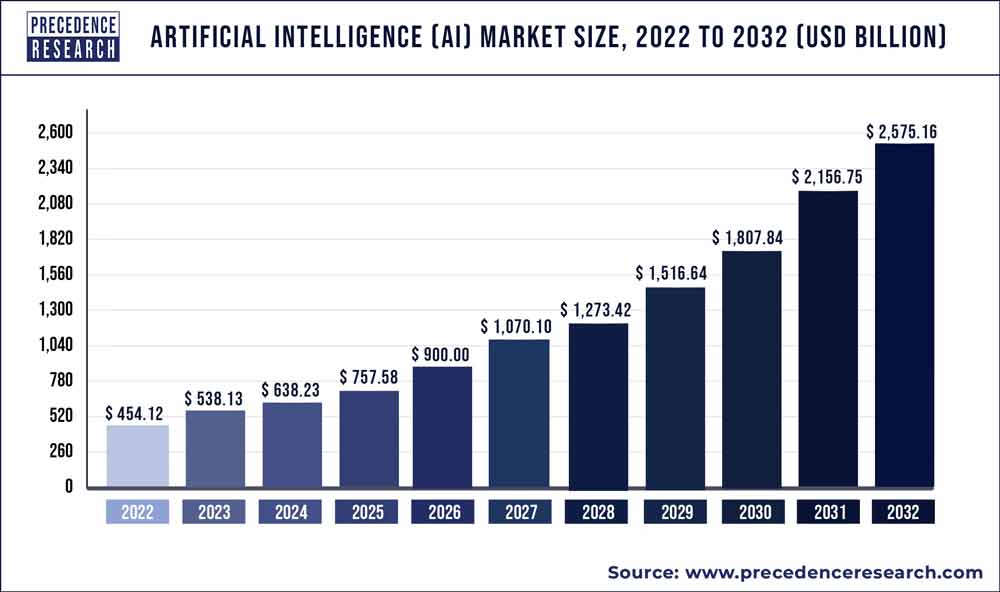
This image is property of www.precedenceresearch.com.
Future trends in the AI market
Increased adoption of AI
The future of the AI market in digital marketing looks promising, with an increased adoption of AI technologies expected. As businesses recognize the benefits of AI in optimizing their marketing efforts, there will be a greater demand for AI-powered tools and platforms. The development of more user-friendly and accessible AI solutions will further fuel this adoption, enabling businesses of all sizes and industries to leverage the power of AI in their marketing strategies.
Advancements in machine learning and natural language processing
Machine learning and natural language processing are two key areas of AI that will continue to advance and shape the future of digital marketing. As machine learning algorithms become more sophisticated and capable of analyzing complex data sets, marketers will have access to more accurate and actionable insights. Similarly, advancements in natural language processing will enable AI systems to better understand and communicate with customers, leading to more personalized and effective marketing campaigns.
Impact of AI on digital marketing professionals
Shift in job roles and skills required
The integration of AI into digital marketing practices will undoubtedly lead to a shift in job roles within the industry. Some tasks that were traditionally performed by marketers, such as data analysis and content creation, will be automated by AI systems. This will require marketers to adapt and acquire new skills related to AI, such as data analytics, AI strategy, and AI-driven creativity. Additionally, new job roles centered around managing and optimizing AI systems will emerge, creating new opportunities for digital marketing professionals.
The importance of upskilling in AI
As AI becomes more prevalent in digital marketing, upskilling in AI-related technologies and concepts will be crucial for professionals in the industry. Digital marketers will need to develop a sound understanding of AI and its applications in order to effectively leverage AI-powered tools and platforms. This may involve acquiring knowledge in machine learning, natural language processing, and data analytics, as well as staying updated with the latest advancements in AI technology. By upskilling in AI, professionals can remain competitive and capitalize on the opportunities presented by the AI market in digital marketing.
In conclusion, the AI market in digital marketing is growing rapidly, driven by the increasing demand for personalized experiences, advancements in technology, and the availability of vast amounts of data. AI has revolutionized digital marketing by enabling personalized advertising, content creation, and customer segmentation. AI-powered tools and platforms, such as chatbots, automated email marketing, and programmatic advertising, have become indispensable in achieving marketing success. Various industry sectors, including e-commerce, financial services, healthcare, and travel, are reaping the benefits of AI in digital marketing. However, challenges related to data privacy, ethics, and human-AI collaboration need to be addressed. Leading AI companies and partnerships are shaping the AI market, while future trends point towards increased adoption of AI and advancements in machine learning and natural language processing. The integration of AI in digital marketing will impact job roles and necessitate upskilling in AI-related skills. As the AI market continues to grow, digital marketing professionals must embrace AI and leverage its power to stay ahead in the ever-evolving digital landscape.
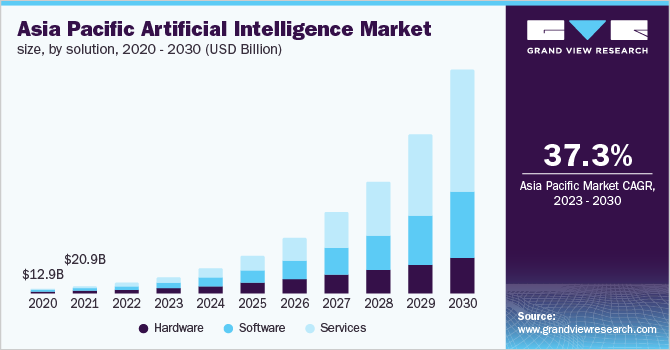
This image is property of www.grandviewresearch.com.
